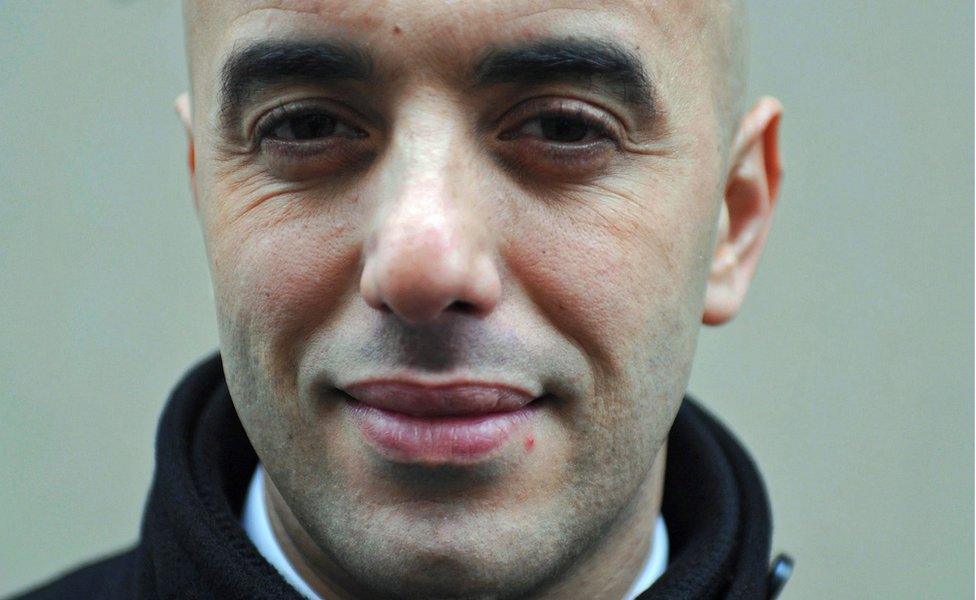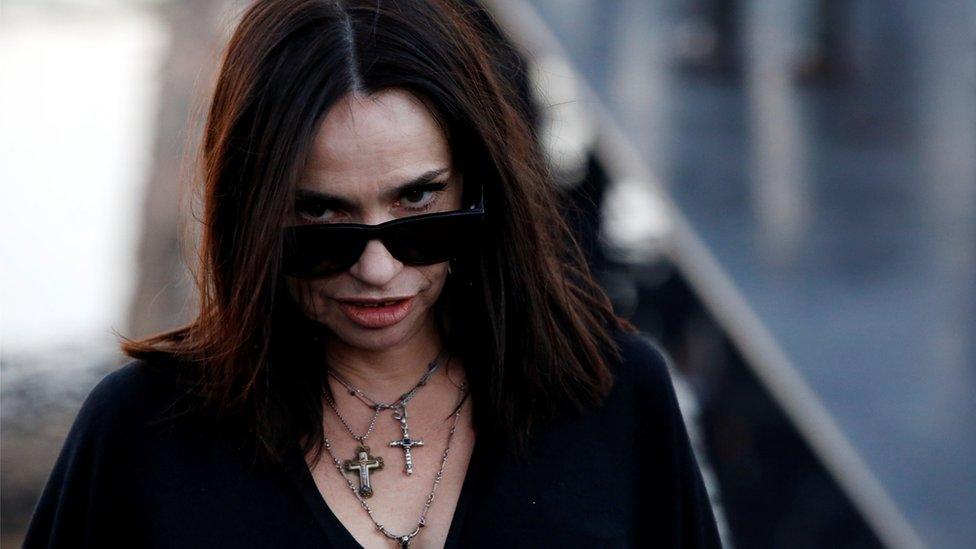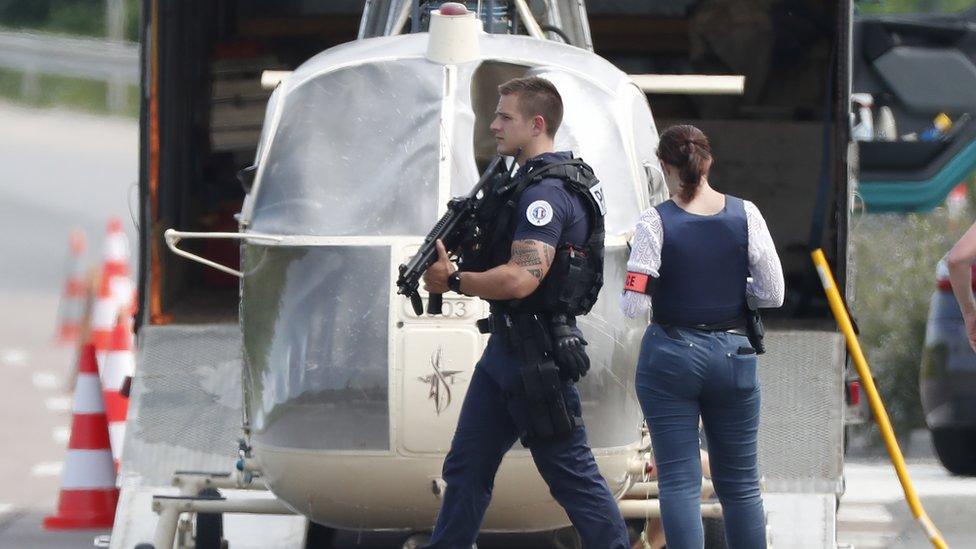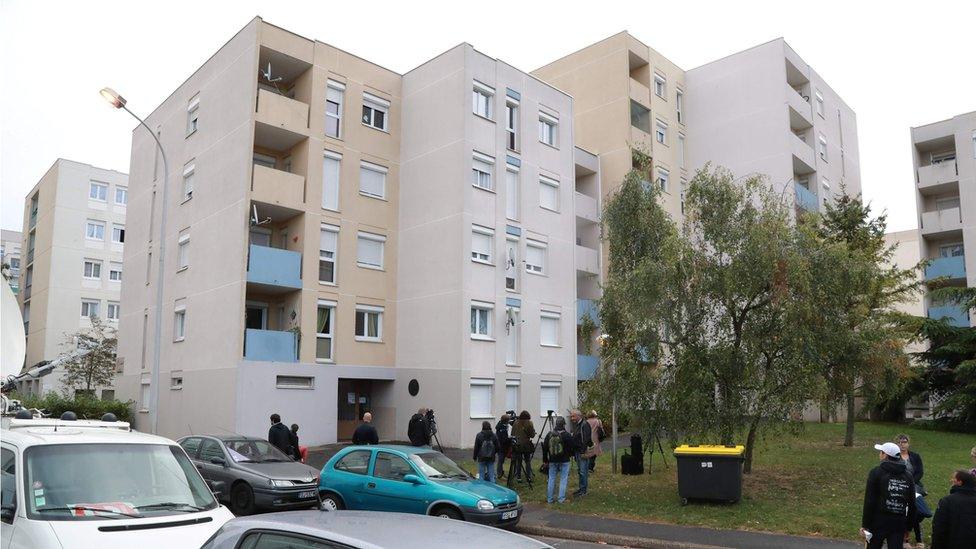Rédoine Faïd case: Why does France love its gangsters?
- Published

Rédoine Faïd's popularity is partly explained by crime films
When Rédoine Faïd made his spectacular prison breakout in July, the actress Béatrice Dalle was delighted.
"God protect you Rédoine," she wrote on his Instagram account. "The whole of France is with you. I am going to be dancing for hours to celebrate."
The actress swiftly retracted when it was pointed out that her hero was serving 25 years for a failed robbery in which a policewoman was shot dead.
But still.
In France, there's always something about a gangster. Especially one who keeps escaping. Especially one who purposely models his hold-ups on Hollywood movies.
And especially one who is articulate enough to write a book of memoirs and become an instant celeb on TV.
Rédoine Faïd did all of that - earning in the process that mixture of indulgence and revulsion which many French seem to feel towards their more notorious truands.

Actress Béatrice Dalle celebrated Faïd's escape on social media
Where does it come from, this fascination?
It is not as if the gangsters in question are not capable of quite awful violence. Faïd once took part in a robbery in which the victim was burned with a blow-torch and made to lie in what he was told was his grave.
He may not personally have shot the policewoman after a motorway chase in 2010, but someone in his gang did.
Other romanticised figures - one thinks of Jacques Mesrine, Tany Zampa, François le Belge - were not just bank-robbers, but killers too.
Perhaps the root lies in France's revolutionary past - which in some way legitimised acts that empty the pockets of the wealthy.
Rédoine Faïd is not the first gangster to portray himself as a Robin Hood-style character, living cleanly and eschewing violence where possible.
"No injured, no dead," was his watchword. "When no-one's hurt, you know you're doing your job correctly," he wrote in his memoirs.

Faïd used a helicopter to break out of prison
It helped too that he could describe the psychological impulses that drove him to do what he did. The French love that kind of intelligent self-analysis.
"You are desperate for the adrenaline that you get from the hold-up. Your body needs it like it needs a drug. In the end, you are not even doing it for the money," he wrote.
There is also a kind of nostalgia at work - a hankering for the good old days when the Marseille milieu fought it out with the Corsicans over gaming machines and prostitution, and before the North African drugs gangs took over.
But ultimately there is a much simpler reason for the fascination, and one of which Faïd himself is acutely aware - and that is the romance of cinema.
The French have a rich tradition of gangster movies of their own. Think of classics like Rififi, Classe Tous Risques, Touchez pas au Grisbi, Les Tontons Flingueurs - as well as the more recent biopic of Mesrine.

Faïd was found by police in his hometown of Creil, north of Paris
The heroes may well be violent, but they are romantic figures - flung towards their fate by psychological forces beyond their control.
For Rédoine Faïd, Hollywood was more influential. But the influence was crucial. In his first job in 1995, he and his gang put on the masks of French politicians - à la Point Break. He, by the way, was former prime minister Raymond Barre.
In a later attack, Faïd and the gang called themselves Mr Orange, Mr Blue etcetera in a nod to Reservoir Dogs. He watched the film Heat 100 times on DVD to learn how to attack an armoured cash van.
According to his psychological report, quoted in Le Monde: "The robberies were carried out as if they were actual scenes of films. He was an actor in his own screenplay."
And the French do love a good movie.